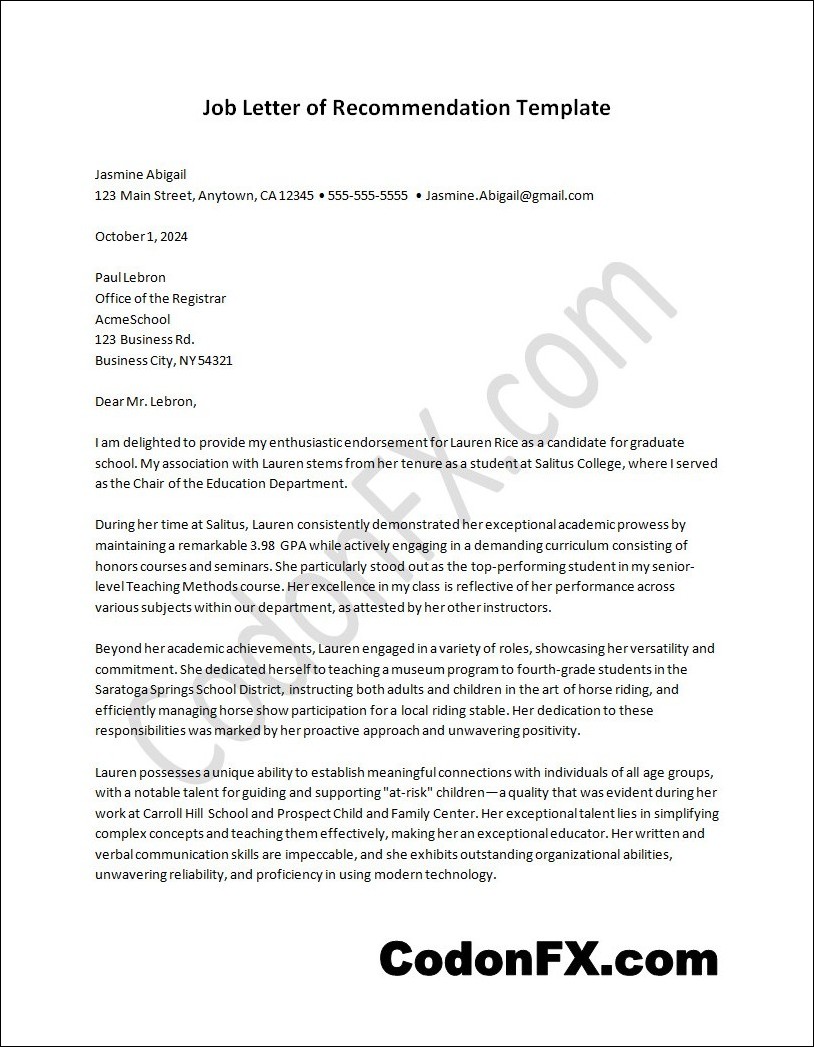
What is a recommendation letter for graduate school?
A recommendation letter for graduate school is a document written by someone who can attest to an applicant’s qualifications and abilities to pursue further education at the graduate level. It serves as a personal endorsement that highlights the applicant’s academic achievements, skills, and potential for success in their chosen field of study. The purpose of a recommendation letter is to provide additional insight into the applicant’s character and capabilities, beyond what can be conveyed through transcripts and standardized test scores.
One of the key benefits of a recommendation letter is that it provides an objective perspective on the applicant’s abilities and potential. Admissions committees often receive numerous applications from highly qualified candidates, and a well-written recommendation letter can help an applicant stand out from the competition. Additionally, a recommendation letter can provide important context to an applicant’s academic record, explaining any extenuating circumstances or highlighting exceptional achievements that may not be immediately apparent.
Furthermore, a recommendation letter can also help admissions committees assess an applicant’s compatibility with the graduate program they are applying to. The letter can speak to the applicant’s specific skills and experiences that align with the program’s curriculum or research focus, demonstrating that the applicant is a good fit for the program. This can greatly enhance an applicant’s chances of being accepted into their desired graduate program.
What to Include in a Graduate School Recommendation Letter
1. Contact Information
When writing a graduate school recommendation letter, it is essential to include your contact information at the top of the letter. This includes your full name, job title or position, institution or organization you belong to, mailing address, phone number, and email address. Providing this information ensures that the recipient of the letter can easily contact you for any further inquiries or clarification.
2. Relationship to the Candidate
In the recommendation letter, clearly state your relationship with the candidate. Explain how long you have known them, in what capacity, and the nature of your interactions. This helps the graduate school admissions committee gain insight into the depth and quality of your relationship with the candidate. For instance, if you were their professor, mention the course(s) you taught them and any significant projects or research they were involved in. If you were their employer, mention their position, responsibilities, and any notable achievements.
3. Endorsement of Their Credentials
One of the most important aspects of a graduate school recommendation letter is endorsing the candidate’s credentials. Highlight their academic achievements, research abilities, leadership skills, and personal qualities that make them suitable for graduate studies. Provide specific examples and instances where the candidate excelled or demonstrated exceptional qualities. It is crucial, to be honest and provide an accurate assessment of the candidate’s abilities and potential. Additionally, if applicable, mention any awards, scholarships, or honors they have received.
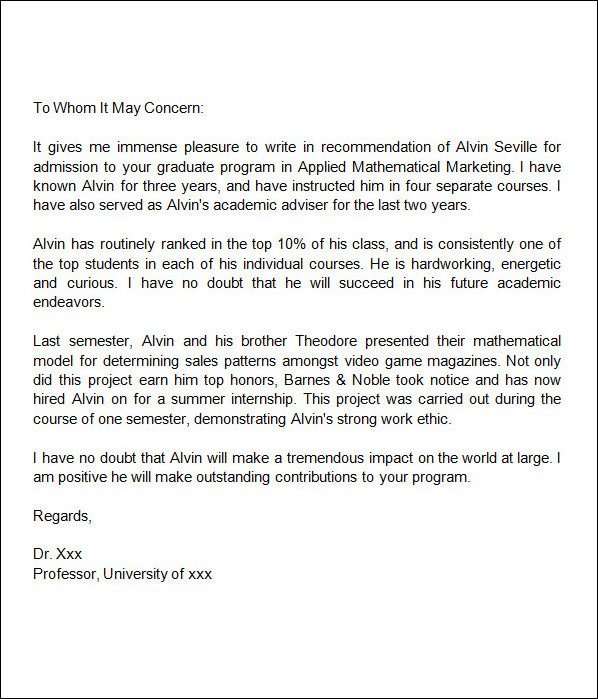
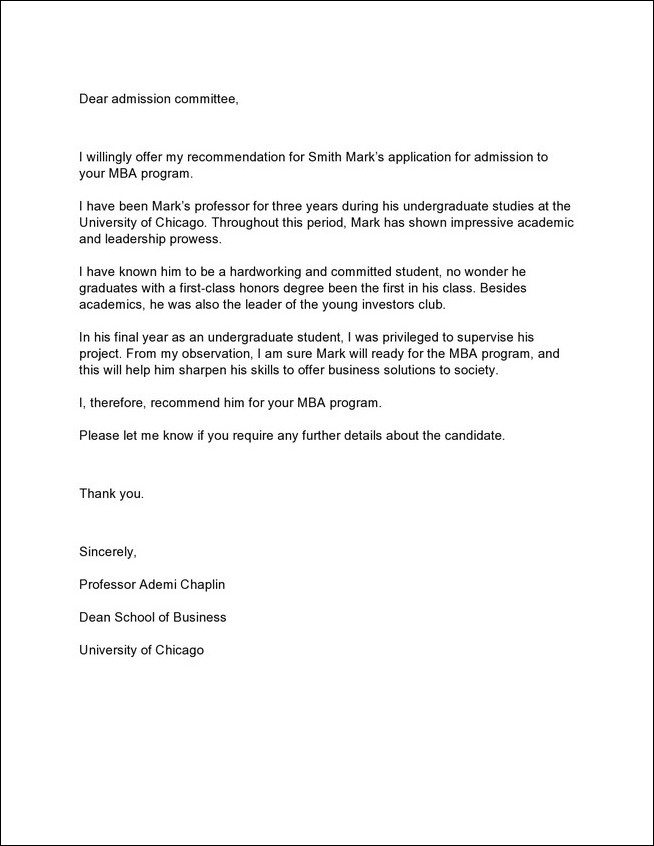
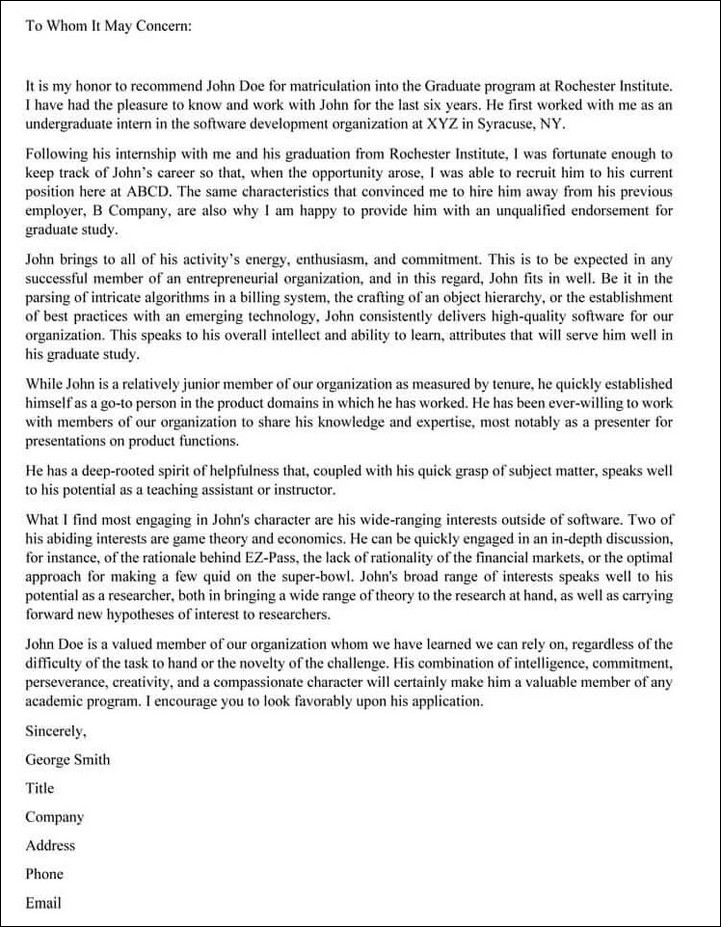
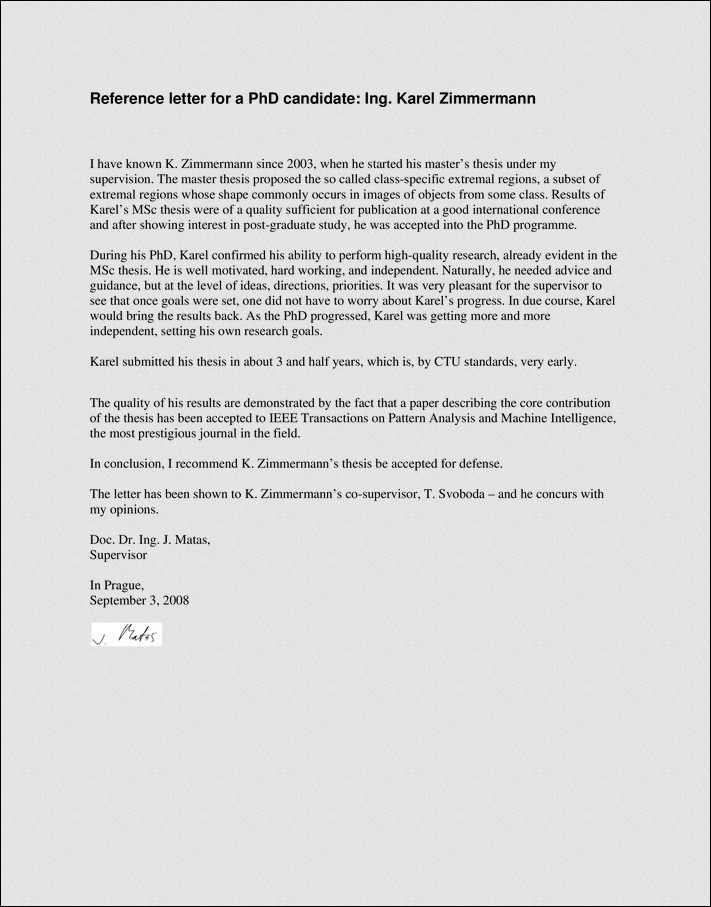
How to Write a Graduate School Recommendation Letter
To ensure that your letter effectively highlights the candidate’s qualifications and strengths, follow these steps:
1. Gather more information about the school
Before you begin writing the recommendation letter, it is essential to gather information about the graduate school the candidate is applying to. Familiarize yourself with the program’s specific requirements, curriculum, and any unique aspects that set it apart. This knowledge will help you tailor your letter to highlight the candidate’s suitability for the program.
2. Introduce yourself to the reader
Start the letter by introducing yourself and your relationship with the candidate. Briefly mention your position, experience, and qualifications to establish your credibility as a recommender. This introduction will provide context for the reader and demonstrate your understanding of the candidate’s capabilities.
3. Discuss the candidate’s relevant attributes
In this section, emphasize the candidate’s relevant attributes that make them an excellent fit for the graduate program. Draw upon your personal experiences with the candidate to support your claims. Highlight their academic achievements, analytical skills, research abilities, and any other qualities that are relevant to their chosen field of study. Use LSI keywords such as “candidate’s relevant attributes” to reinforce the importance of this section.
4. Cite specific examples from your experience
To further strengthen your recommendation, provide specific examples from your experience working or studying with the candidate. Share anecdotes that demonstrate their dedication, teamwork, problem-solving abilities, or any other qualities that impressed you. These examples will add credibility to your recommendation and paint a vivid picture of the candidate’s abilities.
5. Reinforce your endorsement of the candidate
In the concluding section, reinforce your endorsement of the candidate by summarizing their strengths and potential contributions to the graduate program. Emphasize their passion, dedication, and unique qualities that make them stand out. Use LSI keywords like “reinforce your endorsement of the candidate” to remind the reader of the importance of this section.
How long should a grad school recommendation letter be?
Ideally, it should be around one to two pages in length. While it might be tempting to write a lengthy letter to highlight every detail about the applicant, it’s important to remember that admissions committees have a large number of applications to review. Therefore, a concise and well-written letter that captures the essential qualities and accomplishments of the applicant is more effective than a lengthy one that may lose the reader’s attention.
It’s crucial to focus on quality over quantity. Admissions committees are looking for letters that provide valuable insights into the applicant’s academic abilities, personal qualities, and potential for success in graduate school. A shorter, well-crafted letter that highlights specific examples of the applicant’s strengths and accomplishments can have a greater impact than a longer, generic letter. Therefore, it’s essential to carefully choose the most relevant information and provide specific examples to support your evaluation of the applicant.
Additionally, it’s important to respect any guidelines provided by the graduate program. Some programs may specify a specific word count or page limit for recommendation letters. In such cases, it’s crucial to adhere to these guidelines to ensure that your letter is not disregarded or deemed inappropriate. Remember that admissions committees value letters that are concise, informative, and showcase the applicant’s qualifications effectively. By following these guidelines and focusing on the quality of your letter, you can provide a strong and impactful recommendation for your graduate school applicant.
Recommendation Letter Template for Graduate School | Word – Download